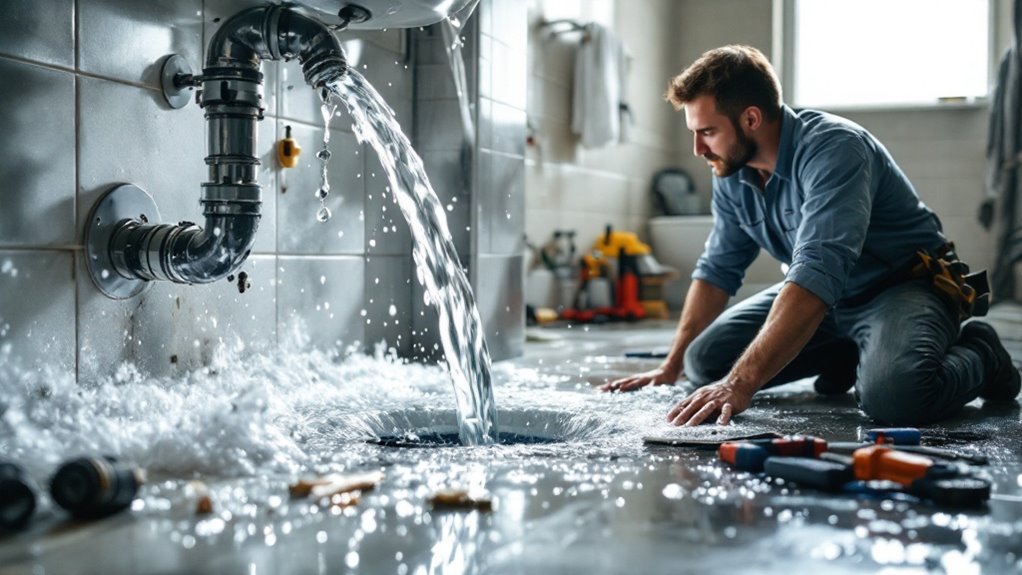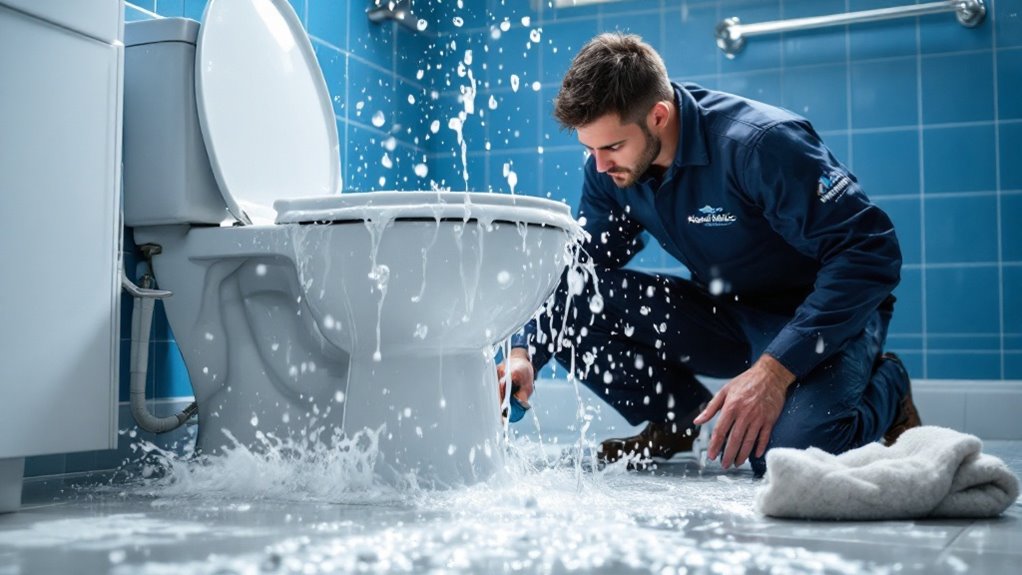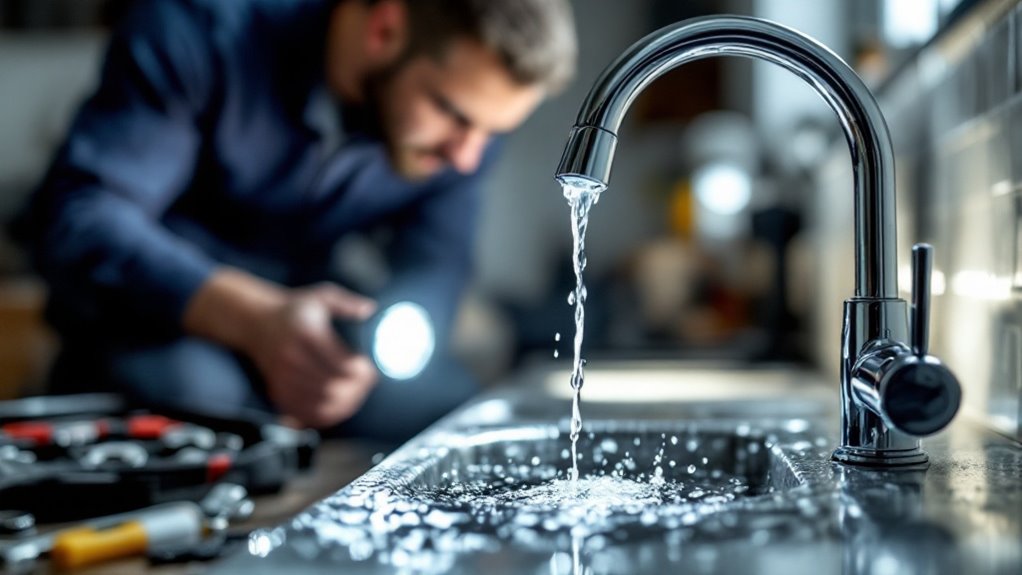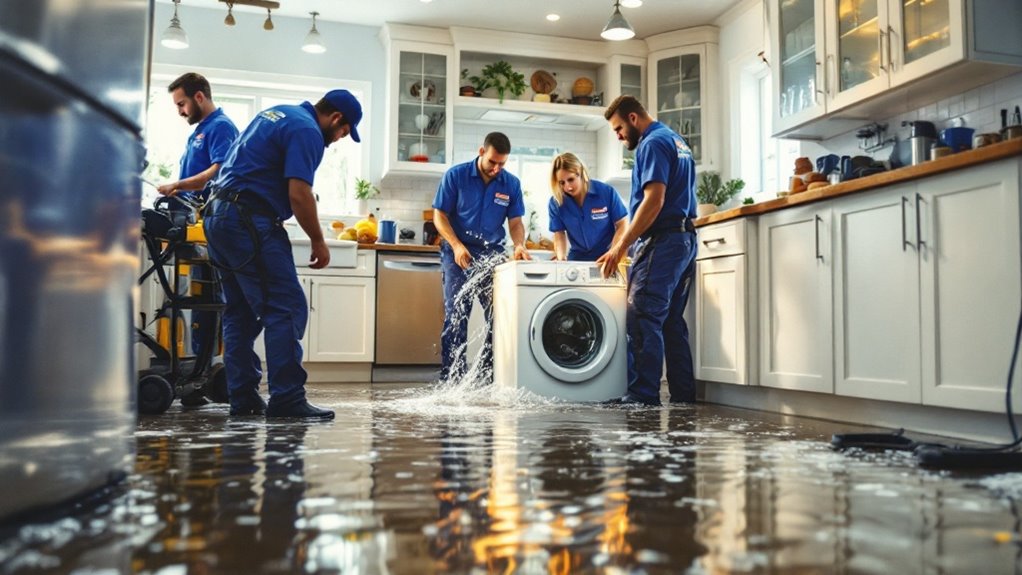In McDonough, common plumbing emergencies like burst pipes and clogged drains demand immediate attention, and that's where Flood Medics shines. When you face a burst pipe, you'll need to shut off the water supply and call professionals to handle repairs fast. For clogged drains, quick fixes like plunging or using a baking soda-vinegar mix can help temporarily, but expert services guarantee long-term solutions. By addressing water heater failures and sewer backups swiftly, Flood Medics keeps your home safe and functional. Stay tuned to learn how they tackle these challenges effectively.
Key Takeaways
- Flood Medics quickly addresses burst pipes by shutting off water supply and draining systems to minimize damage and prevent further issues.
- For water heater failures, Flood Medics provides rapid response and skilled technicians to restore hot water efficiently.
- Clogged drains are tackled with effective methods like plunging or using baking soda and vinegar for quick relief and long-term solutions.
- In case of overflowing toilets, Flood Medics stops the overflow and utilizes proper tools to dislodge blockages immediately.
- Flood Medics ensures professional maintenance and repair services to prevent future plumbing emergencies and protect homes in McDonough.
Burst Pipes: Causes and Immediate Solutions

When temperatures drop, burst pipes can quickly become a homeowner's worst nightmare. To prevent this disaster, you need to focus on proper pipe insulation, especially in unheated areas like basements and attics. Insulating your pipes keeps them warm and reduces the risk of freezing in low temperatures. If you do experience a burst pipe, act fast—shut off the water supply immediately. Then, drain the system by opening faucets and flushing toilets. You can likewise use towels to soak up any water, minimizing damage. After addressing the immediate issue, contact a professional plumber to assess the situation and make necessary repairs. Remember, staying proactive with insulation can save you from costly repairs and stress in the long run. Additionally, rapid response times from emergency plumbing services can significantly minimize damage caused by burst pipes.
Clogged Drains: Quick Fixes for Blockages
While dealing with burst pipes demands immediate attention, clogged drains can similarly disrupt your home's plumbing system. Quick fixes can ease your frustration and restore flow. Here are three effective strategies:
- Boiling Water: Pouring boiling water down the drain can dissolve minor blockages, especially grease buildup.
- Baking Soda and Vinegar: This natural method promotes drain cleaning by creating a fizzing reaction that helps break down debris.
- Plunger Use: A reliable plunger can provide the necessary force to dislodge stubborn clogs.
Regular maintenance is key for blockage prevention. Make drain cleaning a routine task, and you'll reduce the likelihood of future issues, ensuring your plumbing system runs smoothly and efficiently. Additionally, you can contact 24/7 emergency plumbing services for immediate assistance when faced with persistent clogs or severe plumbing emergencies.
Overflowing Toilets: How to Handle the Situation

When your toilet overflows, quick action is essential to prevent water damage. First, you'll need to address immediate actions, understand common causes, and implement preventative measures to avoid future incidents. Let's investigate the steps you can take to effectively manage this plumbing emergency.
Immediate Actions to Take
What should you do if your toilet starts overflowing? First, remain calm. Panic won't help, and quick action is essential. Here's what to do:
- Shut off the water supply: Locate the shut-off valve behind the toilet and turn it clockwise. This stops further water flow, preventing additional damage.
- Use your plumbing toolkit: Equip yourself with a plunger or a toilet auger from your toolkit. These tools can help dislodge any blockages causing the overflow.
- Call a professional: If the issue persists, reach out to a plumbing service. Being prepared for emergencies can save you time and stress.
Taking these immediate actions guarantees you're handling the situation effectively while safeguarding your home from potential water damage.
Common Causes Explored
Understanding the common causes of overflowing toilets can help you address issues before they escalate. Key factors include:
| Cause | Description |
|---|---|
| Clogged Drain | Debris buildup obstructs flow. |
| Faulty Float Mechanism | Misadjusted float leads to overfill. |
| Pipe Corrosion | Deteriorated pipes may leak or break. |
| High Water Pressure | Excessive pressure can overwhelm the system. |
| Plumbing Maintenance | Neglect leads to unseen issues. |
Being aware of these causes allows you to act quickly. Regular plumbing maintenance can prevent problems like pipe corrosion and clogs from developing into emergencies. When you spot signs of trouble, don't hesitate to reach out for professional help to keep your plumbing system in check.
Preventative Measures Explained
To effectively prevent overflowing toilets, implementing regular maintenance and monitoring practices is essential. By following these key preventative measures, you can safeguard your home:
- Conduct Routine Inspections: Regularly check for signs of wear in the toilet components, such as the flapper and fill valve.
- Monitor Water Levels: Verify the water level in the tank is appropriate. Adjust the float if necessary to prevent overfilling.
- Educate Household Members: Make certain everyone knows what can and can't be flushed. This simple step can prevent clogs and subsequent overflows.
Water Heater Failures: Signs and Rapid Responses
A malfunctioning water heater can quickly disrupt your daily routine, leading to distress and inconvenience. Look out for signs like inconsistent water temperatures, strange noises, or leaks. These issues not only compromise your comfort but can additionally impact your energy efficiency. Regular water heater maintenance is essential; it helps catch problems early and guarantees your unit operates effectively.
If you notice any warning signs, don't hesitate to act. Shut off the power and water supply to prevent further damage. Contact Flood Medics for a rapid response. Our skilled technicians can diagnose and repair the issue swiftly, restoring your hot water and peace of mind. You deserve a reliable water heater—let us help you maintain it for peak performance.
Leaky Faucets: Identifying and Repairing the Issue

Leaky faucets can stem from various causes, including worn washers and damaged seals. Identifying the issue early can save water and reduce your utility bills, and you have several quick fix techniques at your disposal. If the problem persists, professional repair services can provide a lasting solution to restore your faucet's functionality.
Causes of Leaky Faucets
When you notice water dripping from your faucet, it's often a sign of underlying issues that require attention. Different faucet types can experience unique leakage sources, leading to frustrating leaks. Here are three common causes:
- Worn Washers: Over time, washers can deteriorate, resulting in leaks.
- Damaged O-Rings: These rubber seals can wear out, especially in cartridge faucets, causing water to escape.
- Corroded Valve Seats: If the valve seat in compression faucets becomes corroded, it can create gaps for water to leak through.
Identifying the source is essential for effective repairs. By understanding these common causes, you can take the first step in addressing the leak and restoring your faucet to ideal function.
Quick Fix Techniques
Addressing a dripping faucet not only saves water but furthermore prevents further damage to your plumbing system. Start by performing leak detection; check the faucet for visible dripping or pooling water. If you notice a leak, gather your emergency kits, including a wrench, screwdriver, and replacement washers. Turn off the water supply, then disassemble the faucet carefully. Inspect and replace any worn-out washers or O-rings. Reassemble the faucet, turn the water supply back on, and test for leaks. This quick fix can restore functionality while minimizing potential water damage. Remember, regular maintenance and prompt repairs are key to keeping your plumbing in top shape. You'll not only save money but likewise maintain the comfort of your home.
Professional Repair Services
Although a dripping faucet may seem like a minor inconvenience, it can indicate underlying issues that require professional attention. To guarantee effective plumbing maintenance, consider these key steps:
- Identify the Source: Determine if the leak originates from the faucet handle, spout, or connections.
- Assess the Components: Check for worn washers, O-rings, or corroded parts that could be causing the leak.
- Seek Emergency Response: If you can't resolve the issue yourself, call a professional for prompt repairs.
Addressing leaky faucets quickly prevents further water damage and costly repairs. Trust experts to handle these emergencies efficiently, assuring your plumbing system remains in top shape while you enjoy peace of mind.
Sewer Backups: Emergency Protocols and Prevention
Sewer backups can pose significant risks to both your property and health, so knowing how to respond quickly and effectively is crucial. First, ascertain your family's safety by evacuating the affected area. Avoid flushing toilets or using water until the issue is resolved. Contact a professional service skilled in emergency response to assess the situation. Regular sewer maintenance, such as cleaning and inspections, can prevent backups from occurring. Be mindful of what goes down your drains; avoid flushing non-biodegradable items that can cause blockages. Implementing these measures not only safeguards your home but furthermore improves your peace of mind, knowing you've taken proactive steps to protect your property from potential sewer disasters.
Flooding From Appliance Malfunctions: Swift Remediation

When appliances like washing machines or dishwashers malfunction, they can quickly lead to significant flooding in your home. Understanding appliance safety is vital in preventing water damage. If you find yourself facing this emergency, act swiftly. Here's what you should do:
- Turn off the water supply: Locate the valve and shut it off immediately to prevent further flooding.
- Unplug the appliance: Disconnecting the power can help avoid electrical hazards while you address the issue.
- Contact Flood Medics: Their professionals specialize in swift remediation, minimizing water damage and restoring your home.
Sump Pump Failures: Importance of Timely Repairs
A malfunctioning sump pump can lead to severe water accumulation in your basement, especially during heavy rainfall or rapid snowmelt. It's vital to act swiftly when you notice any issues. Neglecting sump pump maintenance can quickly escalate into costly repairs or a complete sump pump replacement.
| Issue | Consequence | Solution |
|---|---|---|
| Pump not activating | Water damage | Immediate inspection |
| Frequent cycling | Wear and tear | Regular maintenance checks |
| Strange noises | Potential failure | Professional assessment needed |
Addressing these problems promptly not only protects your home but additionally saves you time and money in the long run. Trust Flood Medics to guarantee your sump pump stays functional and reliable.
Frequently Asked Questions
How Can I Prevent Plumbing Emergencies in My Home?
To prevent plumbing emergencies, you should prioritize preventive maintenance and schedule routine inspections. Regularly check for leaks, clean drains, and monitor water pressure. These proactive steps can save you money and stress in the long run.
What Are the Signs of a Plumbing Emergency?
You'll notice signs of a plumbing emergency through foul odors or water stains on ceilings and walls. These indicate leaks or clogs, demanding immediate attention to prevent further damage and costly repairs down the line.
When Should I Call a Plumber for a Minor Issue?
When should you call a plumber for minor issues? If a leak persists or a clog worsens in spite of your plumbing tips, don't hesitate. Timely intervention can prevent bigger headaches down the road. Trust your instincts!
Are DIY Fixes Safe for Plumbing Emergencies?
DIY fixes can be risky during plumbing emergencies. You might unintentionally worsen the problem, compromising your emergency preparedness. It's often better to call a professional who can quickly and safely resolve the situation for you.
How Much Does Emergency Plumbing Service Typically Cost?
While emergency plumbing costs can feel intimidating, service rates typically range from $100 to $300 per hour. Factors like time of day and complexity influence emergency pricing, ensuring you receive quality help when you need it most.
